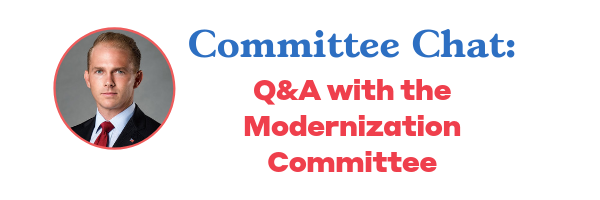As partisan bickering and political divides continue to dominate headlines, it’s easy to forget that positive things are happening in Congress. Despite this, progress is being made, including on the Modernization Committee—one of the few truly bipartisan committees in Congress.
So, what can Congress as a whole learn from the Modernization Committee’s bipartisan leadership and its members? And what’s next for the committee as it works to find ways to make Congress work better for the American people?
We sit down with committee member and freshman Rep. William Timmons (R-SC) in the next edition of our series, “Committee Chat: Q&A with the Modernization Committee.” Check out the Q&A below!

Before coming to Congress, I served for two years in the South Carolina State Senate. I was born and raised in Greenville, South Carolina, and have spent my entire life there. I completed my undergraduate degree at the George Washington University and got my JD and MA from the University of South Carolina. I opened six small businesses in South Carolina and still own four of them. Opening small businesses really opened my eyes to the challenges that small business owners face on a daily basis. I found the bureaucracy and red tape so incredibly frustrating that I decided to run for office. Serving as a state senator prepared me for Washington in the sense that you have to work with other people who may not have similar views. But I was able to build and maintain relationships that enabled me to get things done in the state house, and I am working on doing the same in Washington.
Well, as I said previously, building and maintaining relationships has enabled me to be effective as a state senator. I am not here for soundbites and grandstanding. I want to be able to work with members on both sides to find solutions to our biggest issues: debt, immigration, healthcare — we are not going to solve our biggest problems arguing with one another on Twitter. If more Members spent more time building relationships, I feel that we could really change a lot about Washington. And I think that is why we have been able to be effective in the Modernization Committee: We are building relationships, having thoughtful discussions, and coming to true bipartisan agreement.
For starters, we can sync the elevators instead of having to push both elevator buttons for elevators in the same area. But there are big items too: we need a more effective calendar and schedule. The House is only in session for 65 full days this year. We spend 66 days traveling to and from our nation’s capital. To me, this is unacceptable. There are 365 days in a year and we only really spend 65 days legislating, and I use that term loosely. In order to be more effective, we need to spend more time working together in Washington. I am not talking about being here every single day, but one way to start would be 5-day work weeks instead of three- or four-day workweeks. And working for two full weeks in a row, rather than one or two here and there. Now, this is a long-term problem that could be addressed, but one that we are working on and that certainly needs our attention. In the near term, we can address and have been addressing: staff recruitment and retention, compensation and pay, as well as the technology used here in the House.
They are constantly asking “why can’t Congress get anything done?!” I had the same question coming to Washington. Now that I am here, I am in the middle of the dysfunction. Suggestions they make to me are along the lines of members needing to work together more and come together to find sensible, thoughtful solutions. Almost everyone agrees the political grandstanding is a huge problem.
Because there are an equal number of six Republicans and six Democrats, and the committee requires 8 votes to pass any recommendations, it truly is a bipartisan committee. That means not just Republicans or Democrats can pass recommendations – it must be bipartisan. As a committee, we hold hearings just like all of the other House committees, but we also schedule just as much time for members to meet with one another in more intimate settings. It could be a lunch, dinner, or a two-hour face-to-face meeting during the day. We meet to brainstorm ideas together and talk through recommendations together. That tactic can and absolutely should be applied to Congress as a whole. If we truly want to affect change and pass substantive policies, everyone is going to need to be a part of the conversation.
I think the committee has already been successful. We are the first Select Committee to pass bipartisan recommendations and actually send them to House Leadership. Whether Congress as a whole will adopt our recommendations is still an open question, but I am very optimistic. As a committee, we are doing everything we can to see them implemented.
I am bizarrely good at bowling. I have bowled a 272 right-handed and a 225 left-handed.